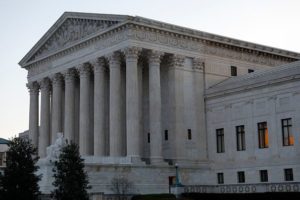
Executives at some of America’s biggest tech companies and retailers are breathing a sigh of relief, while many in the pharmaceutical sector aren’t happy.
The mixed feelings come in the wake of an important ruling in a seven-year-old patent case that sets a clear precedent around intellectual property rights in the U.S.
More specifically, the Supreme Court decision determined that a company loses its patent rights to a product once it has been sold, whether at or home or overseas.
The case was brought by printing company Lexmark International, which was trying to stop smaller companies refurbishing and reselling its used printing cartridges. Many of the smaller companies settled with Lexmark, but one, Impression Products, held out for a ruling.
“Extending the patent rights beyond the first sale would clog the channels of commerce”
The Supreme court ruled against Lexmark 8-0 on one point and 7-1 on another, overturning an earlier appeals court decision in Lexmark’s favor.
“Extending the patent rights beyond the first sale would clog the channels of commerce, with little benefit from the extra control that the patentees retain,” Chief Justice John Roberts wrote.
The decision has obvious implications for CEOs in the printing sector. HP and Cannon, for example, will lose out on sales of replacement cartridges. But its implications go much further than printing.
Any company that resells and repairs another company’s products would have been sweating the decision. And that could include tech companies that use multiple components in their products made by others which may have been subject to more licensing costs should the decision have gone the other way.
Justice Roberts gave the example of an auto-repair shop while justifying the court’s ruling. “The business works because the shop can rest assured that, so long as those bringing in the cars own them, the shop is free to repair and resell those vehicles,” he wrote. “That smooth flow of commerce would sputter if companies that make thousands of parts that go into a vehicle could keep their patent rights after the first sale.”
Some of America’s biggest companies, including Costco and Intel, had made court submissions that supported the final ruling. Not surprisingly, companies in patent-heavy industries, such as biotechnology, pharmaceutical and agricultural companies, backed Lexmark during the case. Many were particularly concerned about the potential for their products to be resold more cheaply overseas then imported back into the U.S.
One of the court’s eight judges, Ruth Bader Ginsberg, dissented on the subject of offshore sales, arguing that patent rights should be protected in this instance. “Because a sale abroad operates independently of the U. S. patent system, it makes little sense to say that such a sale exhausts an inventor’s U. S. patent rights.”
Regardless, her opinion was in a minority of one and the ruling stands on all counts.

Chief Executive Group exists to improve the performance of U.S. CEOs, senior executives and public-company directors, helping you grow your companies, build your communities and strengthen society. Learn more at chiefexecutivegroup.com.
0

1:00 - 5:00 pm
Over 70% of Executives Surveyed Agree: Many Strategic Planning Efforts Lack Systematic Approach Tips for Enhancing Your Strategic Planning Process
Executives expressed frustration with their current strategic planning process. Issues include:
Steve Rutan and Denise Harrison have put together an afternoon workshop that will provide the tools you need to address these concerns. They have worked with hundreds of executives to develop a systematic approach that will enable your team to make better decisions during strategic planning. Steve and Denise will walk you through exercises for prioritizing your lists and steps that will reset and reinvigorate your process. This will be a hands-on workshop that will enable you to think about your business as you use the tools that are being presented. If you are ready for a Strategic Planning tune-up, select this workshop in your registration form. The additional fee of $695 will be added to your total.

2:00 - 5:00 pm
Female leaders face the same issues all leaders do, but they often face additional challenges too. In this peer session, we will facilitate a discussion of best practices and how to overcome common barriers to help women leaders be more effective within and outside their organizations.
Limited space available.

10:30 - 5:00 pm
General’s Retreat at Hermitage Golf Course
Sponsored by UBS
General’s Retreat, built in 1986 with architect Gary Roger Baird, has been voted the “Best Golf Course in Nashville” and is a “must play” when visiting the Nashville, Tennessee area. With the beautiful setting along the Cumberland River, golfers of all capabilities will thoroughly enjoy the golf, scenery and hospitality.
The golf outing fee includes transportation to and from the hotel, greens/cart fees, use of practice facilities, and boxed lunch. The bus will leave the hotel at 10:30 am for a noon shotgun start and return to the hotel after the cocktail reception following the completion of the round.